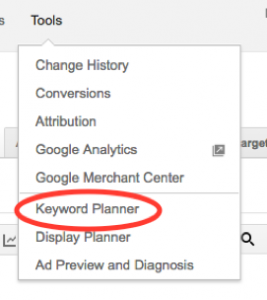In the previous article we talked about the benefits of setting up a good account structure. Your AdWords account structure is only the foundation. More importantly, you need to wrap your head around understanding the key principles of keywords, which we will talk about today.
Keywords are the core value of your account. Without them, your ads would not show at all, so make sure you’re selecting the best keywords to advertise your product/service.
There are a few different ways you can uncover keywords. The easiest way is to open up your website, and open up a word document or a spreadsheet and start jotting down words that relate to what you are going to be advertising.
Once you have your list of main keywords found on your landing page, enter them into Google’s Keyword Planner, which you can find inside your account.
This will show the volume of traffic and, majority of the time, will give you a rough indication of what the CPC for those keywords will be. Here you can see whether the keywords you have selected have enough volume and are within your budget.
If you require more keywords, you can use the planner to search for new keywords using a phrase or your website URL. AdWords will bring up a list of keyword ideas that you can use, along with their monthly search volume so that you can see which keywords will potentially bring you more traffic.
When it comes to keywords – there are 4 different match types: Broad match, broad match modified, phrase match & exact match. Each match type has its advantages and disadvantages.
Broad Match – written: pink hats
Broad match is AdWords default match type. Broad match lets a keyword trigger your ad whenever someone searches for that phrase, similar phrases, singular forms, plural forms, synonyms, misspellings, relevant variations & other related searches. You would use broad match if you want to target as many people as possible.
Pros
Broad match allows you to reach a wide range of people, receive the most impression value – so you will have a lot of search term data to help you find new potential keywords.
Cons
You will receive a lot of unnecessary clicks, which can waste budget and will require you to constantly check the search terms report for negative keywords
Modified Broad – written: +pink +hats
Modified broad match still offers a lot of reach, however it gives you more control than you get with broad match. If someone searches for +pink +hats, those terms must be in the user’s query. However, they don’t have to be in that order and there can be other terms in there too.
Pros
Still a lot of search volume, but more targeted then just broad match keywords.
Cons
You will still get irrelevant searches which can waste budget and will require you to constantly check the search terms report for negative keywords.
Phrase – written: “pink hats”
Phrase match allows your ad to trigger when a user types in the exact phrase or the phrase with terms added either before the phrase or after the phrase. Eg. “Pink Hats,” “buy Pink Hats,” “Pink Hat reviews.”
Pros
Allows a high degree of control over the search query.
Cons
As there can be terms before or after the phrase, you may get some irrelevant searches.
Exact – written: [pink hats]
Exact match is the most targeted match type of the four. Your ad will only appear if the user types that exact phrase. Eg. If your keyword is “Pink Hats” the user must type in “Pink Hats” to have your ad appear.
Pros
Extremely targeted
Cons
No potential to uncover new keywords and lower impression share
Hopefully you now have a better idea about how Adwords keywords work. You’re going to come across many different keyword strategies and people trying to tell you what works and what doesn’t. The truth is, there is no best way. What works for someone else may not work for your brand. What works today may not work next month. You have to keep testing and trying out different strategies in order to find out what works best for you.
In the next article we will cover off writing your ad copy, and the important things to remember to include when doing so.




